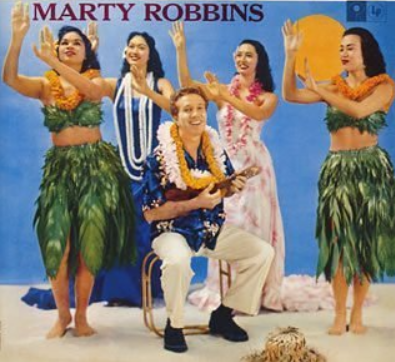
My Isle of Golden Dreams: A Gentle Echo of a Faded Romance
In a bygone era, when a song could paint a picture and tell a story with a simple, heartfelt melody, a tune emerged from the legendary crooner, Marty Robbins. It was a time when the world moved at a slower pace, and the airwaves were filled with the gentle strumming of guitars and the rich baritone voices of men who sang of love and loss. One such song, a beautiful, wistful ballad, was “My Isle of Golden Dreams”. This song, a hidden gem in Robbins‘ vast discography, didn’t ascend the dizzying heights of the pop charts like some of his more iconic hits, but it holds a special place in the hearts of those who remember its soft, resonant notes. Released in 1960 on the album “More Gunfighter Ballads and Trail Songs,” it was a quieter moment on a record filled with epic tales of the Old West. While it might not have reached a chart position of note, its emotional weight and enduring beauty are undeniable, a testament to the power of a well-crafted song to transcend fleeting trends.
The story behind “My Isle of Golden Dreams” is a poignant one, steeped in the melancholic romance of a love that can only exist in the mind’s eye. The song is not a simple love ballad but a reflection on a deep, abiding connection that has been lost to time or distance. It speaks of a lover who has sailed away, leaving behind a heart that yearns for a return. Robbins‘ voice, always a masterful instrument, carries the weight of this yearning with a quiet dignity, each note a sigh, a memory, a hope. The lyrics are a beautiful tapestry of longing, weaving together images of a distant paradise—the titular “isle of golden dreams”—with the reality of a lonely, waiting heart. This isle is not a physical place but a metaphorical one, a sanctuary of memory where the love affair continues to thrive, untouched by the cruelties of the real world. It is the place where the singer can be with his beloved, even if only in his dreams.
The meaning of the song is deeply rooted in the universal human experience of nostalgia and a yearning for what once was. For older readers, the song can be an emotional journey back to a time when they might have experienced a similar kind of loss or longing. It speaks to the bittersweet nature of memory—the joy of recalling a cherished moment and the pain of knowing it can never be relived. Marty Robbins‘ delivery is key to the song’s power. He doesn’t belt out the lyrics with a theatrical flourish but instead sings them with a quiet, introspective grace, as if he is confiding in a dear friend. The gentle, almost lullaby-like melody of the song only adds to this feeling, making it feel like a shared secret, a whispered memory between two old souls. This song is a quiet tribute to the enduring power of love, even when it is only a memory. It is a reminder that some connections are so strong they can survive the passage of time and the distance of a lifetime, forever existing on our own personal “isle of golden dreams.” It’s a song for quiet evenings, for thoughtful reflection, for those moments when we allow ourselves to drift back to a cherished past and feel the warmth of a love that, though gone, is never truly forgotten.